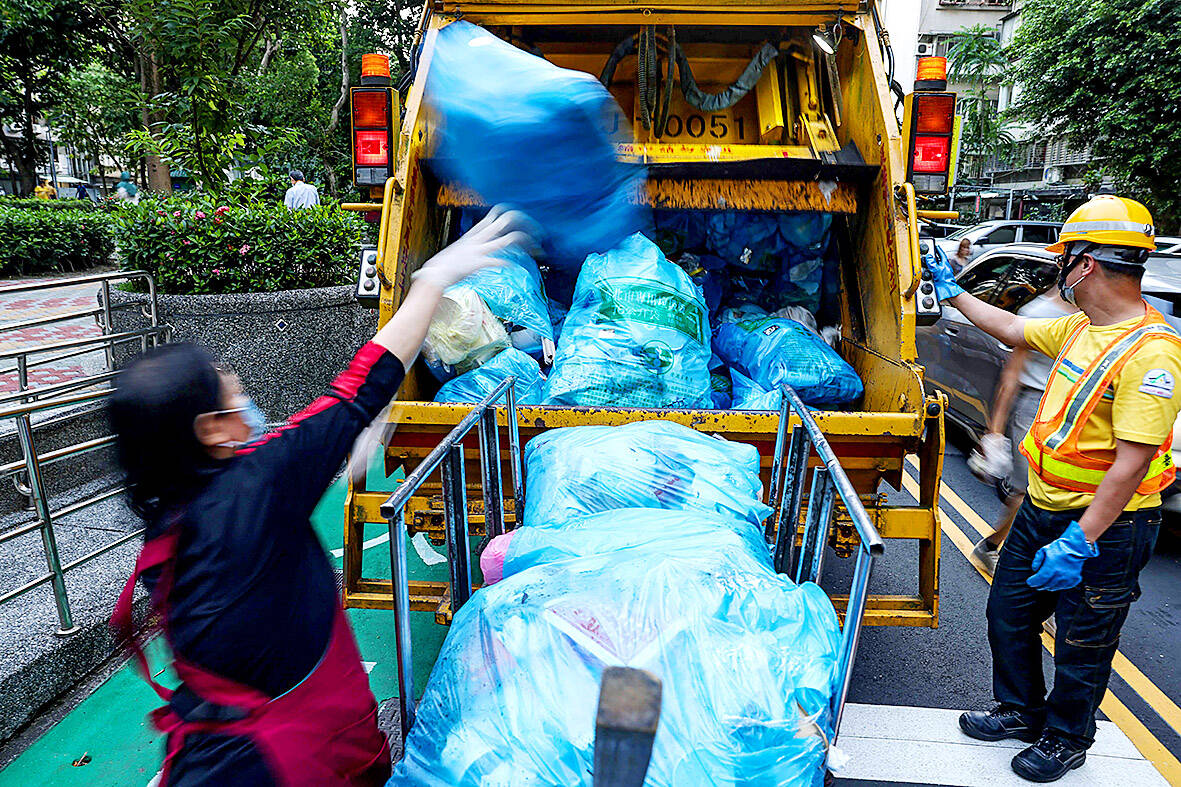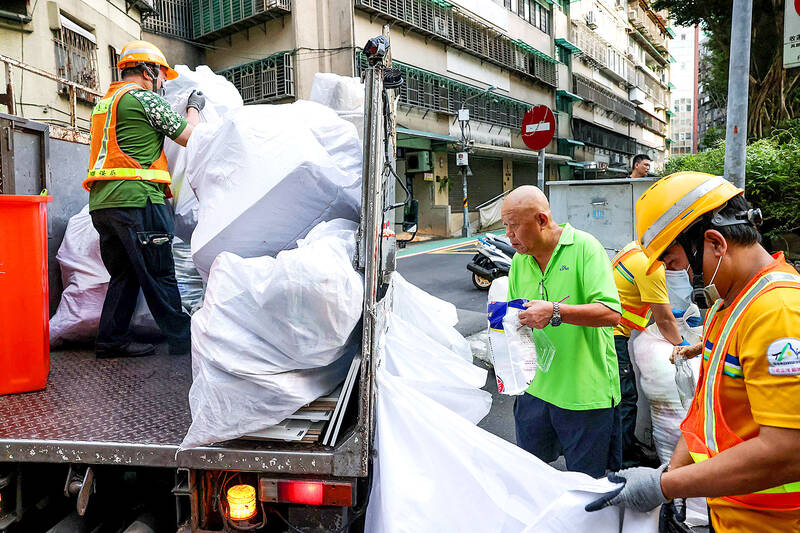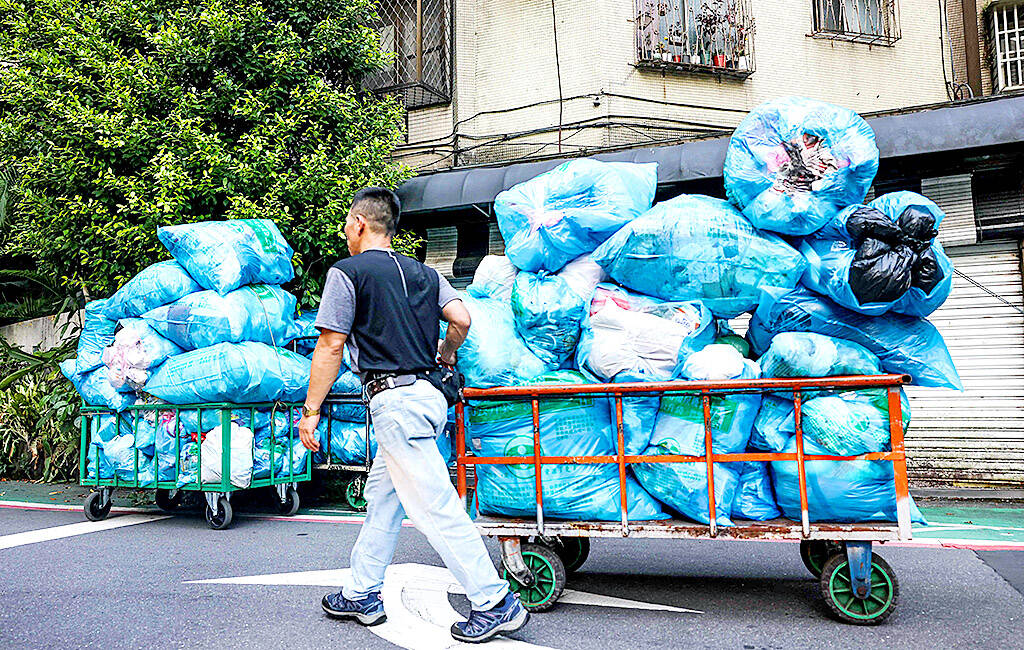Taiwanese residents holding plastic bags of rubbish stand on a footpath as a yellow garbage truck playing classical music over a loudspeaker pulls up.
For decades, the tinkling of Beethoven’s Fur Elise or Tekla Badarzewska-Baranowska’s Maiden’s Prayer has alerted Taiwanese households to take out their garbage.
Like clockwork, residents emerge from their apartment buildings carrying bags of pre-sorted rubbish as the musical garbage trucks approach.

Photos: AFP
“When we hear this music, we know it’s time to take out the trash. It’s very convenient,” 78-year-old Lee Shu-ning said as she waited outside her tower block in Taipei.
Residents toss plastic bags of general refuse into the yellow compaction truck, and tip food waste and recycling into bins carried by another vehicle. For the elderly, taking out the trash has become a social event and many arrive early to sit and talk around the collection points.
“I can chat with some old neighbors and friends, it’s nice,” Lee said, before disposing of several bottles and cans.

Photo: AFP
“It’s also a kind of exercise,” she added.
But not everyone is a fan.
“I think it’s quite inconvenient because it comes at a fixed time every day,” said 31-year-old beautician Dai Yun-wei after dumping her rubbish in the truck.

Photo: AFP
“Sometimes we’re not home or we’re busy, so we can’t throw away the trash.”
SAVING TIME
Taiwan’s musical garbage trucks have been an almost daily feature of life since the 1960s, said Shyu Shyh-shiun of Taipei’s Department of Environmental Protection.
Taiwan imported German garbage trucks pre-programmed with Fur Elise, Shyu said, but added it was not clear how the Maiden’s Prayer became part of the repertoire.
The trucks operate five days a week, usually in the late afternoon and evening. Yang Xiu-ying, 76, has made a living out of helping her neighbors dispose of their garbage. She receives NT$11,200 (US$380) a month from 28 households in her lane to sort their trash, load it onto a trolley and take it to the refuse trucks.
“Some people get off work late, some elderly people find it inconvenient, so they take it downstairs and I dump the garbage for them,” Yang said, wearing two layers of gloves and long protective sleeves.
Others have turned to digital solutions for their rubbish problem. The young founders of Tracle created an app enabling people to book a time for their trash to be taken away.
“I think our value is that we save a lot of time for them,” co-founder Ben Chen said. “We enhance their life quality.”
CLEANING UP
Over the past 30 years, Taiwan has been cleaning up its waste management act.
An economic boom had led to an explosion of garbage, with almost no recycling, landfills overflowing and people protesting air and ground pollution. In response, the island ramped up recycling, increased incineration and made people responsible for sorting and dumping their own trash in the trucks instead of leaving it on the ground for collection.
Taipei residents are also required to buy government-approved blue plastic bags for their general waste to encourage them to use less and recycle more.
“In the beginning, everybody feels... that it’s not very convenient,” Shyu said.
But once people started noticing the cleaner streets, “they feel this is a good policy.”
The city’s recycling rate has surged to nearly 67 percent, from two percent in 2000, and the amount of garbage sent for incineration has fallen by two-thirds, Shyu said.
And, he said, smiling, the trucks are “almost” always on time.

Google unveiled an artificial intelligence tool Wednesday that its scientists said would help unravel the mysteries of the human genome — and could one day lead to new treatments for diseases. The deep learning model AlphaGenome was hailed by outside researchers as a “breakthrough” that would let scientists study and even simulate the roots of difficult-to-treat genetic diseases. While the first complete map of the human genome in 2003 “gave us the book of life, reading it remained a challenge,” Pushmeet Kohli, vice president of research at Google DeepMind, told journalists. “We have the text,” he said, which is a sequence of

On a harsh winter afternoon last month, 2,000 protesters marched and chanted slogans such as “CCP out” and “Korea for Koreans” in Seoul’s popular Gangnam District. Participants — mostly students — wore caps printed with the Chinese characters for “exterminate communism” (滅共) and held banners reading “Heaven will destroy the Chinese Communist Party” (天滅中共). During the march, Park Jun-young, the leader of the protest organizer “Free University,” a conservative youth movement, who was on a hunger strike, collapsed after delivering a speech in sub-zero temperatures and was later hospitalized. Several protesters shaved their heads at the end of the demonstration. A

Every now and then, even hardcore hikers like to sleep in, leave the heavy gear at home and just enjoy a relaxed half-day stroll in the mountains: no cold, no steep uphills, no pressure to walk a certain distance in a day. In the winter, the mild climate and lower elevations of the forests in Taiwan’s far south offer a number of easy escapes like this. A prime example is the river above Mudan Reservoir (牡丹水庫): with shallow water, gentle current, abundant wildlife and a complete lack of tourists, this walk is accessible to nearly everyone but still feels quite remote.

In August of 1949 American journalist Darrell Berrigan toured occupied Formosa and on Aug. 13 published “Should We Grab Formosa?” in the Saturday Evening Post. Berrigan, cataloguing the numerous horrors of corruption and looting the occupying Republic of China (ROC) was inflicting on the locals, advocated outright annexation of Taiwan by the US. He contended the islanders would welcome that. Berrigan also observed that the islanders were planning another revolt, and wrote of their “island nationalism.” The US position on Taiwan was well known there, and islanders, he said, had told him of US official statements that Taiwan had not